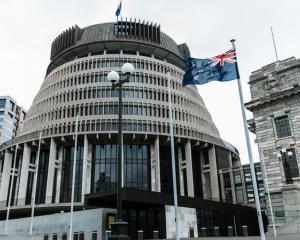Rather than dismiss it out of hand as a waste of time and money, the Government and other critics of the planned inquiry into banking by Opposition parties would do well to consider seriously at least some aspects.
Labour, the Greens and the Progressives are using the Reserve Bank's recent report on funding costs and margins as a principal justification, and in the present atmosphere of concern about the disparity between New Zealand's and Australia's economy, that is as good a reason as any.
The Reserve Bank's governor suggested an inquiry would be useful, particularly with regard to some interest rates which he said were too high, but that prospect in an official sense has been effectively dismissed by the Government.
It is not hard to see why the idea of an inquiry into trading banks might hold popular appeal for politicians trying to gain a foothold in the attention stakes: banks are rarely considered other than as the villain when things go wrong and, being extremely profitable enterprises even in a recession, are doubly damned.
The four major New Zealand banks are Australian-owned and are, according to Progressive Party leader Jim Anderton, charging some interest rates in this country that are higher than they charge in Australia.
He thinks this is suspicious - could those beastly banks be profiteering at our expense? - and he wants the banks to answer questions about the differences.
According to Mr Anderton, overseas-owned banks "took" $11.7 billion out of New Zealand last year in interest and profits, "more than the entire sum collected in GST revenue".
Furthermore, "The amount they have been paying themselves has increased rapidly over the last three or four years."
Mr Anderton, it needs to be be remembered, championed the "people's bank", Kiwibank, with its taxpayer start-up capital, to try to break the monopoly of the "big four", or at least provide an alternative.
He drew attention to this recently by saying the Australian-owned banks charged interest on unsecured loans of 17.95%, compared with 16.9% charged by Kiwibank; interest on a standard Westpac credit card was 19.45% here, whereas in Australia, despite having a higher official cash rate, the comparable interest rate was 17.74%.
Kiwibank, he said, charged 12.9% on its standard credit cards.
The Greens want the banks to provide "greater transparency" about their charges, lending practices and profitability, but that is a futile wish without compulsion.
Labour's finance spokesman, David Cunliffe, whose political future as a potential party leader may well improve or fall on the outcome of such a high-risk strategy, has been talking about producing a "high-quality report" with "workable recommendations" subject to "independent international analysis".
For their part, the trading banks - long used to such sport - claim their costs in this country have been increasing because of the way they fund themselves from offshore borrowings.
What is perhaps most curious about the matter is the "bob-each-way" comment by the Prime Minister, who said, in the context of Dr Bollard's observation, that the Reserve Bank should "show us solutions and the Government will consider them . . . we have an impasse now. If there is something that should be done, let's act."
In other words, the Government - while acknowledging there is a problem - admits to powerlessness to do something about it and wants "suggestions".
It is not that long ago that the Government was publicly demanding the banks pass on reductions in the official cash rate.
On that basis the Opposition's inquiry might provide some useful information, assuming the banks provide it.
They will do so only if they see an advantage to themselves.
Much may also depend on whether Dr Bollard (who will need Government permission) agrees to participate.
Mr Key was on safer ground reminding critics that customers of banks still have choices, and can themselves decide where to invest or borrow money.
His claim that banks' profit margins are now 30% lower than they had been in recent years, though, could be interpreted by sceptics as a very good reason for a formal inquiry.
It may also spark the banks to at least make a submission, if only in an attempt to justify their wealth.











